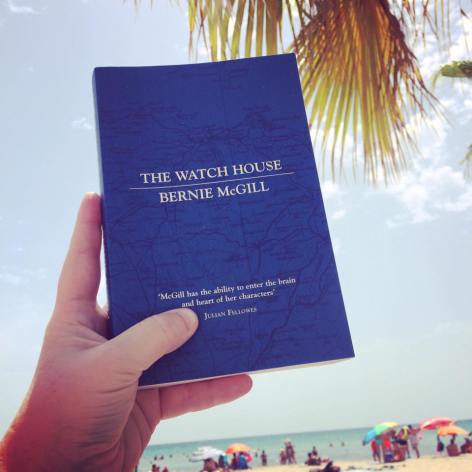
I’m a big fan of Bernie McGill. I love her writing. The Butterfly Cabinet was one of the first Northern Irish books I read after moving back home from the States. I have a really clear memory of finishing this beautiful novel and thinking, this isn’t just good by local standards, it’s actually, properly marvellous. I was particularly taken by the way Bernie managed to seamlessly weave carefully researched historical detail through a rollicking good plot and still leave room for beautiful, meandering descriptions, exquisitely drawn characters and that wonderful local dialogue she has such an ear for. What a read. The Butterfly Cabinet quickly became one of those books I keep on my surefire birthday present buying list, i.e. the kind of book you’d have to be an absolute idiot/some sort of deviant human being, not to love. (Stop me if you want to know which other books are on there).
Next, Bernie gave us the devastatingly, wonderful short story collection, Sleepwalkers. We all squashed our way on to the Belfast Barge to launch it in style; so many hot and sweaty bookish folk, there was a moment, halfway through the evening, when it seemed likely the barge was heading for the bottom of the Lagan. That evening has always stuck in my head as one of the moments I first became aware something strange and marvellous was beginning to happen in Northern Ireland’s literary community and that there were exciting times ahead for all of us. Sleepwalkers is a delight to read. It is the kind of book which sinks its teeth into you and comes slipping back into mind, in frames and segments at the oddest times. The stories occasionally flirt with the fantastical, are always written with a kind, but unswerving, eye for the best and worst in human beings and, unsurprisingly appeal to a person who falls heavily on the realist side of Magic Realism.
I have just finished reading Bernie’s latest book, The Watch House. I took it with me to Spain and read it in one very hot afternoon, propped up beneath a palm tree on the beach. I found it impossible to put down. I actually think I might have Bernie to blame for the fact that I sunburnt both my shins in the process. What a strange and captivating wee book The Watch House is. It is so very definitely grounded in the geography and culture of Rathlin Island. At times you can really feel the claustrophobic crush of island living. The deftly woven folklore and myth, the beautiful descriptions of the rugged, coastal landscape, the dialogue so perfectly attuned to the North Antrim lilt, and Nuala, the novel’s chief narrator, who is both a woman of her times -constrained by rural life and circumstance- and a kind of modern heroine, pursuing happiness in spite of a dire situation. I loved the familiarity of this story. It felt like reading a little bit of my own history. I know these landscapes. I’ve heard these stories and the way of telling them. I can picture the scenes and scenarios Bernie describes even though I grew up almost a hundred years after the period in which The Watch House is set. It is an odd and somewhat unsettling experience to find yourself reading a book, beneath a palm tree in tropical conditions, while in your head you are miles away, shivering on the Rathlin to Ballycastle ferry.
So much of The Watch House‘s success hinges on the historical detail Bernie has employed consistently throughout the novel. You can see where she’s spent hours of careful research discovering all the details necessary to make her story believable, and yet it never feels preachy or bogged down in unnecessary facts. I loved the backstory of Marconi’s scientific experiments. There is a kind of magic about the idea of sending sound messages across the sea which sits really comfortably beside the old island magic of myth and religion. Mention of Marconi’s work also helped to frame the smaller, more familial story, within the context of the wider world. I often forget, when reading historical novels and stories, set in one particular locale, to consider what is happening elsewhere in the world at this point in history. Bernie does this with extreme skill throughout The Watch House.
At the beginning of this blog, I said I was a Bernie McGill fan. I’m not just a fan of Bernie’s work. I’m a massive fan of Bernie the person as well. In her own quiet, understated way, Bernie has encouraged me many times over the years: conversations, coffees, chance encounters at literary events. She’s delivered wise words softly, and always with a twinkle in her eye. It’s taken me three books to realise that Bernie has a very similar approach to writing. I remain a tremendous fan and am glad to have another book to put on my surefire birthday present buying list.
You can catch Bernie McGill at a literary event near you at some stage in the next few months, details below:-
Flowerfield Arts Centre, Portstewart
Thursday 21st September 2017 at 7pm
Launch of The Watch House in conversation with Eimear O’Callaghan, author of Belfast Days: A 1972 Teenage Diary
In association with the John Hewitt Society
Admission Free but please reserve a place by phoning 028 7083 1400 or email reception@flowerfield.org
North Down Museum, Bangor
Sunday 24th September 2017 at 3pm
Reading from The Watch House with David Park, author of The Truth Commissioner and The Poets’ Wives, introduced by writer and broadcaster Malachi O’Doherty
An Aspects Festival event. Booking details here: http://aspectsfestival.com
No Alibis Bookshop, Botanic Avenue, Belfast
Tuesday 17th October 2017 at 6pm
Reading from The Watch House, in conversation with Jan Carson, author of Malcolm Orange Disappears and Children’s Children
A Belfast International Festival event. Full programme details to be announced: https://belfastinternationalartsfestival.com





